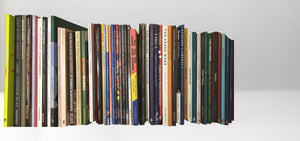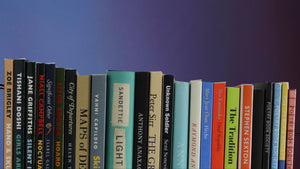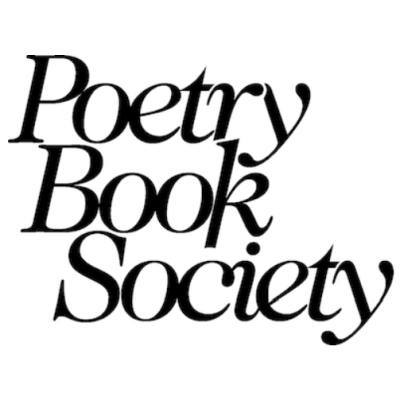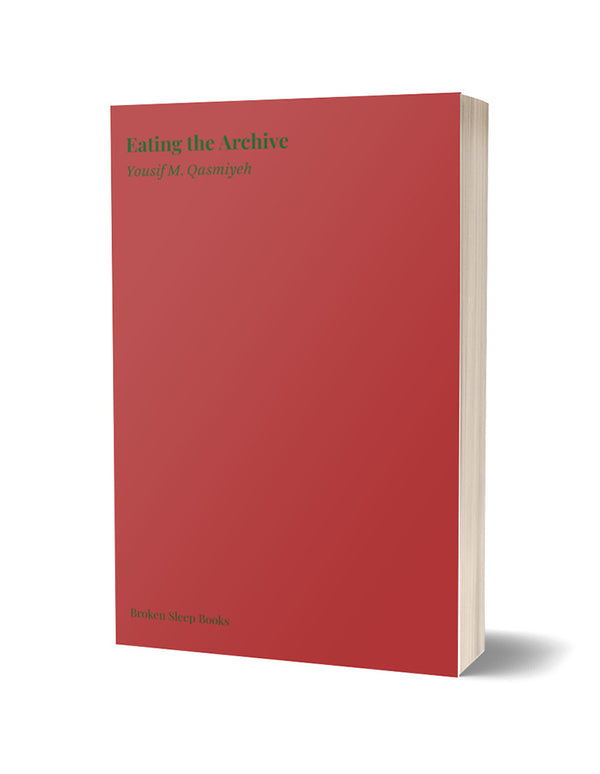Eating the Archive by Yousif M. Qasmiyeh
Broken Sleep Books
Eating the Archive by Yousif M. Qasmiyeh offers a stunning portrait of life in the Baddawi refugee camp in Lebanon, where Qasmiyeh was born. The poems examine even the harshest aspects of the camp with tenderness, pondering existential questions about time, family, language and identity. A mother’s blurry photograph, a father’s sharpened knife, blood stirred into watery lentils and other glimpses into Qasmiyeh’s upbringing enrich this raw and profound collection.
PRAISE for Eating the Archive:
In Eating the Archive, Yousif M. Qasmiyeh offers object lessons on what is — and isn’t — graspable: a photograph, a frying pan, a gun, language, time, prayer, a mirror, a razor, a divination bowl. Who is the author of the archive? The poet bears witness, to what lives and dies right in front of him, and inside him. He does this by writing, 'a trace still as it is still.' To read Yousif M. Qasmiyeh is to step into a caesura: a place where presence and absence engage with attention; a place where erasure speaks back; a camp of voices that refuse to be forgotten or silent.
— Pádraig Ó Tuama, Poetry Unbound
Federico Garcia Lorca suggested that every poet has a wound, but what if, as Yousif M. Qasmiyeh writes in his new book Eating the Archive, ‘the wound is continuously postponed’? Enter memory lodged with shrapnel, where to view anything culminates in breathing through time that ‘cuts through words’. This vast and beautifully parablesque second collection by Qasmiyeh is a poetics of rupture, of cracks and fissures. Here we find a writer so philosophically alert to the crossing of danger that is ‘experience’. With a knack for echolalic narrative, Qasmiyeh is able to both fragment and distil time, looping back to remember and re-remember what happened to the author and his family from their time in Lebanon’s Baddawi refugee camp. Eating the Archive offers us a densely physical consideration of language—the difficulties of writing to name anything that comes from the archive of mind and body through to the ‘limb of a word’—where writing itself is risk. Qasmiyeh is one of the most exciting new writers of the twenty-first century.
— James Byrne, Of Breaking Glass
Qasmiyeh’s camp is a space for reckoning. In his poems, home is a tomb and the present is situated in the afterlife of history, as he calls it, where there is “No one to question our dying. No one to shed a tear for what is happening behind walls. Thin, flawed walls built for the temporary in mind.” The field some have begun to call the literature of displacement is where the world’s most important writing is taking place and Qasmiyeh’s second collection confirms that he is one of its brightest rising talents.
— André Naffis-Sahely, The Promised Land: Poems from Itinerant Life
Eating The Archive by Yousif M. Qasmiyeh is a poetic counter-archive of the refugee camp. It visibilises what is otherwise rendered invisible in the official archives. Qasmiyeh’s poems “can see,” emerging powerfully from prolonged waiting in the camp, where “waiting is seeing”. This important book is an invitation to think in the cracks of the walls, where cracks and the spaces of in-betweenness are also witnesses for wounded names and faces – a space where the poet can breathe in his mother tongue by breathing with his mother. Eating The Archive is an open gateway to encounter the camp that is lost in conventional ethnographic observations and fieldwork.
— Shahram Khosravi, ‘Illegal’ Traveller
Broken Sleep Books

MEMBERS ENJOY 25% OFF ALL POETRY BOOKS

Join the Poetry Book Society for 25% off all books
Join the Poetry Book Society for 25% off all books

